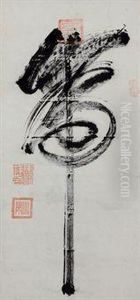Ma Fuxiang Paintings
Ma Fuxiang was a notable figure in the early 20th century Chinese political and military landscape, born in 1876 in Linxia, Gansu, into a Hui (Chinese Muslim) family. His military career and political involvement were deeply intertwined with the complex tapestry of China's transition from the Qing Dynasty to the Republic era, showcasing his adaptability and influence in a time of immense change. Ma Fuxiang's contribution is not only marked by his military endeavors but also by his role in promoting education and understanding between Muslim and Han communities in China.
Ma's military career began in the Qing Dynasty's army, where he swiftly rose through the ranks due to his leadership skills and strategic acumen. He was deeply involved in the suppression of revolts and in the defense against foreign invasions, earning him recognition and promotion. Following the fall of the Qing Dynasty in 1912, Ma aligned himself with the Republic of China, becoming a key figure in the politics of Gansu and surrounding regions. He served as a warlord of the Ma clique, a powerful faction within the Chinese Muslim community, asserting control over Gansu and expanding his influence to Qinghai and Ningxia.
Throughout his career, Ma Fuxiang held various governmental and military positions, including governor of Gansu and Ningxia, and he played a significant role in the struggle against the expanding influence of other warlords and foreign powers in China. His governance was characterized by efforts to modernize his territories, improve infrastructure, and promote education. He was particularly interested in fostering understanding and cooperation between the Muslim and Han populations, advocating for Muslim education that included both Islamic and modern secular studies.
Ma Fuxiang's involvement in national politics also saw him participating in efforts to unify China under a central government, including serving on the Nationalist government's Mongolian and Tibetan Affairs Commission. His work in this capacity reflected his broader vision for a unified, stable China that embraced its diverse cultures and religions. Despite the turbulent times, Ma's legacy is remembered for his contributions to the military defense of China, his forward-thinking approach to governance and education within the Muslim communities, and his efforts to promote national unity.
He died in 1932, leaving behind a complex legacy that reflects the challenges and changes of early 20th century China. Ma Fuxiang's life and career encapsulate the struggles of a nation in transition, as it grappled with internal strife, external threats, and the quest for modernization and unity. His efforts to bridge cultural and religious divides and his contributions to the military and political spheres have ensured his place in Chinese history.
